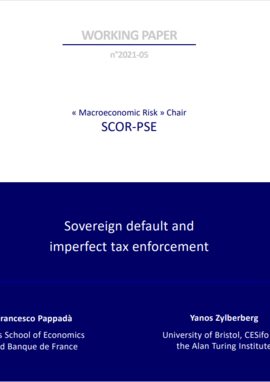SCOR-PSE “Macroeconomic Risk” Chair: Working Paper on Sovereign default and imperfect tax enforcement

Working papers serie, “Macroeconomic Risk” Chair
SCOR-PSE: WP n°2021-05 - Sovereign default and imperfect tax enforcement
By Francesco Pappadà (Paris School of Economics and Banque de France) and Yanos Zylberberg (University of Bristol, CESifo and the Alan Turing Institute).
Sovereign default risk typically decreases in response of fiscal consolidations. However, the response of sovereign default risk to fiscal policy is dampened when tax enforcement is weak. A fiscal consolidation leads to an expansion of the informal sector, thereby limiting fiscal surpluses, but also hampering future tax collection and failing to reduce default risk. For instance, during the European sovereign debt crisis of 2009 - 2014, several economies with relatively low tax enforcement implemented fiscal consolidations that led to significant welfare costs but limited effects on default risk.
The paper uncovers novel empirical facts about the dynamics of tax compliance and its impact on default risk. It shows that tax compliance is volatile with large heterogeneity across countries. In economies with imperfect tax enforcement, a larger share of taxpayers hides their activity in downturns and in periods of austerity. This alters the relationship between fiscal policy and default risk. The paper thus finds that fiscal consolidations are associated with a marked decrease in default risk, but only in countries where tax compliance is inelastic. It further studies the dynamics of fiscal policy and default risk when tax enforcement is imperfect and quantify the welfare cost associated with imperfect tax enforcement: a too responsive tax compliance significantly constrains optimal fiscal policies, which, ultimately, makes consumption smoothing more difficult and significantly lower welfare.
